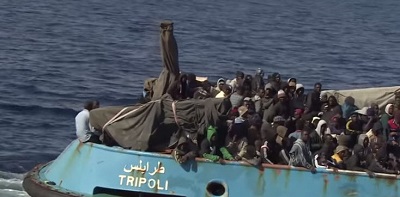EUNAVFOR Med Established to Foil Traffickers
The E.U. Council has agreed May 18 to establish an E.U. military operation EUNAVFOR Med to break the business model of smugglers and traffickers of people in the Mediterranean. This decision, which is one element of the comprehensive E.U. response to the migration challenge, will enable the formal start of the operational planning for the naval operation.
EUNAVFOR Med will be conducted in sequential phases and in accordance with the requirements of international law. Planning of the operation and the initial phase of surveillance and assessment of human smuggling and trafficking networks in the Southern Central Mediterranean will be conducted as soon as possible. The second and third phases of the operation would work to search, seize and disrupt the assets of smugglers, based on international law and in partnership with Libyan authorities.
 The operational headquarters of EUNAVFOR Med will be in Rome and Rear Admiral Enrico Credendino (Italy) has been appointed as Operation Commander. The common costs of the operation are estimated at €11.82 million for a two months start-up phase plus an initial mandate of 12 months.
The operational headquarters of EUNAVFOR Med will be in Rome and Rear Admiral Enrico Credendino (Italy) has been appointed as Operation Commander. The common costs of the operation are estimated at €11.82 million for a two months start-up phase plus an initial mandate of 12 months.
BIMCO Welcomes Move
The decision of the E.U. Council to launch EUNAVFOR Med was strongly welcomed by BIMCO, following the association’s statement on 24 April calling for an extension of Operation Triton’s geographical reach.
BIMCO’s April statement highlighted the risks to the health, safety and security of seafarers who assist distressed migrants in increasingly large numbers – and that merchant shipping is not equipped to handle the humanitarian crisis at sea caused by the levels of migration in the Mediterranean.
Giles Noakes, Chief Officer for Maritime Security at BIMCO, said: “It is reassuring to see the efforts of EU leaders continuing to address this crisis – and now beyond the search and rescue mission of Operation Triton – to help deal with the people smugglers and the business model that is building the humanitarian crisis of distressed migrants in the Mediterranean Sea.
 “We understand that this is – legally and ethically – a complex issue for the U.N. and the E.U. to address, but it must be addressed for the sake of the refugees and the safety and security of seafarers and ships. Migration is a long term problem for nations to solve, but a fundamental aim right now must be to destroy the business model of people-smugglers.
“We understand that this is – legally and ethically – a complex issue for the U.N. and the E.U. to address, but it must be addressed for the sake of the refugees and the safety and security of seafarers and ships. Migration is a long term problem for nations to solve, but a fundamental aim right now must be to destroy the business model of people-smugglers.
“The stated intention of EUNAVFOR Med to search, seize and disrupt the assets of people-smugglers – in partnership with Libyan authorities – is crucial to that aim and we welcome this announcement and future efforts on this.”
HRAS: Staged Approach Makes Sense
Founder and CEO of Human Rights at Sea, David Hammond, says he welcomes all immediate lawful measures that mitigates the suffering of migrants attempting to cross the Mediterranean at the hands of criminal smuggling gangs and associated networks.
“The loss of life of innocent persons seeking a better life for themselves and their families has been unprecedented over the last two years and the international shipping community has done much to assist migrants where possible, as per international law requirements. The shipping community and Human Rights at Sea are individually aligned on this issue,” says Hammond.
.jpg) “The phased delivery of this operation in a step-by-step approach makes both military and political sense, but those planning and authorizing must be wary of the long-term unintended consequences of their potentially short-term actions which historically are usually limited by both funding and political will. Recent events since the western-backed intervention in Libya in 2011 should also serve as a stark warning.
“The phased delivery of this operation in a step-by-step approach makes both military and political sense, but those planning and authorizing must be wary of the long-term unintended consequences of their potentially short-term actions which historically are usually limited by both funding and political will. Recent events since the western-backed intervention in Libya in 2011 should also serve as a stark warning.
“Fundamentally, migrants will still move up the main arterial trafficking routes through the Sahel and human bottlenecks will build. Migration towards Europe will not stop. One of the consequences will most probably be that the E.U. mission will need to contend with a multi-headed hydra that will rapidly adapt to any E.U. actions across the entire North African coastline and which will risk much to continue to make money, including sacrificing the lives of migrants at sea.”
Doomed to Failure
“This sabre-rattling exercise is almost certainly doomed to failure,” says Captain John Dalby, Founder and CEO of Marine Risk Management. “The flow will not stop because of EUNAVFOR’s intervention.”
Dalby questions the intention to partner with the Libyan authorities. “How naive can one be? Which authority, what form would a partnership take and how would it be policed without “boots on the ground?”
As for the destruction of potential immigrant boats, Dalby says it is impossible and essentially very risky.
The opinions expressed herein are the author's and not necessarily those of The Maritime Executive.
